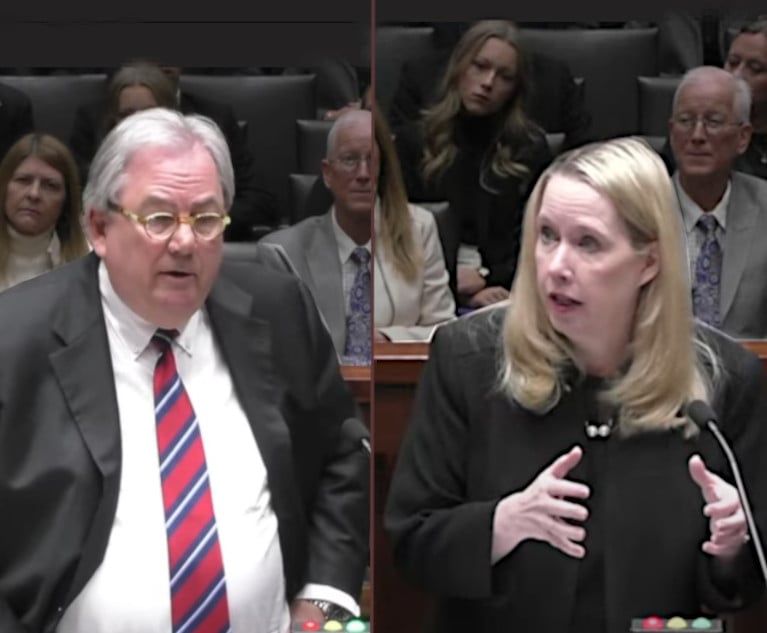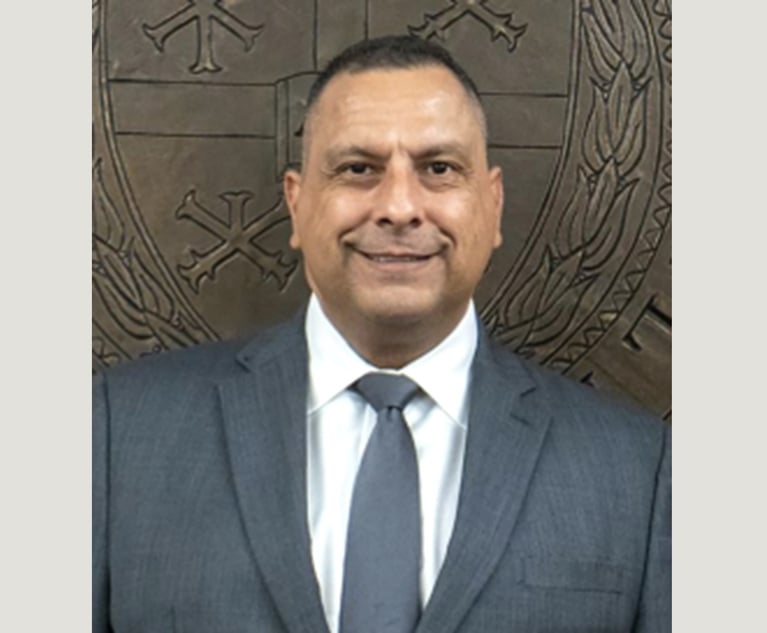Thompson & Horton Lawyers Accused of Asking 'Abusive' Questions to Plaintiffs in Baylor University Sex Assault Suit
"I don't think there's an appropriate way to ask a woman what she was wearing that contributed to her own fault, or questions of the race of the assailant, or how far he penetrated you," said plaintiffs lawyer Jim Dunnam.
April 16, 2019 at 10:31 AM
4 minute read
 Baylor University in Waco, Texas. Photo:Photo: Matthew Minard
Baylor University in Waco, Texas. Photo:Photo: Matthew Minard
Fifteen Jane Doe plaintiffs who sued Baylor University over its alleged mishandling of their sexual assault claims have said in a new court document that the university's defense lawyers—from Thompson & Horton—asked abusive deposition questions that “attempt to brand a scarlet letter on someone unfortunate enough to be raped.”
In response, the defense team say they've treated the plaintiffs with respect, and don't want to make the litigation experience unpleasant for the plaintiffs. But they added that Baylor has a right and responsibility to learn about the circumstances of the plaintiffs' allegations.
“These depositions are Baylor's first opportunity to learn what allegedly happened,” said an April 15 response by Baylor.
The outside counsel for Baylor handling the depositions include Thompson & Horton partners Holly McIntush and Lisa Brown and associate Ryan Newman. Brown and Newman declined to comment, and McIntush didn't respond to a request for comment before deadline.
This is just the newest public relations snafu arising from discovery in the case, Doe v. Baylor University, pending in the U.S. District Court for the Western District of Texas in Waco. It comes on the heels of the university and its former law firm, Pepper Hamilton, provided notice they had produced documents, after losing an earlier battle over whether they had to give up a trove of records related to the firm's investigation into sexual assault on campus and 2016 report that noted the university failed at many levels in handling allegations.
“The fact they were assaulted goes to damages, but the play-by-play of the sexual assault, I don't see it has any relevance to anything,” said plaintiffs lawyer Jim Dunnam of Dunnam & Dunnam in Waco. “Asking these questions at all is reprehensible, and I don't think there's an appropriate way to ask a woman what she was wearing that contributed to her own fault, or questions of the race of the assailant, or how far he penetrated you.”
The allegations of abusive depositions are buried in an April 9 response to Baylor's motion to compel the plaintiffs to produce certain records. Some questions have asked about plaintiffs' communications “that Baylor deems as prurient” and have nothing to do with the case but are meant to “belittle, harass, and further traumatize” the plaintiffs. Opposing counsel say the depos are forcing the women to relive minuscule details of their assaults.
Read the filing here.
The response provides a list of alleged abusive questions, delving into things like how deeply the assailant's penis penetrated a plaintiff, how a plaintiff's shorts fit her, whether lights were on or doors were closed to bedrooms, whether plaintiffs were crying, what assailants said to them and asking, “What happened when he was done?”
“Because Baylor has admitted its [Title IX] policies and procedures were deficient and required no fewer than 105 remedial actions, Baylor has no other defense to this case other than to accuse all 15 of these plaintiffs as liars and attempt to send a message that continuation of this lawsuit will result in further trauma,” said the response, which argued the plaintiffs have complied with discovery and the court shouldn't allow further abuse by ordering the release of minutiae.
But Baylor's April 15 reply argued the plaintiffs haven't fully produced Facebook messages, texts and more. Regarding the depo questions, it says the plaintiffs seek substantial damages, and that issues about whether and how the alleged assaults occurred and the reporting of the incidents to Baylor are at the heart of the case. Baylor is allowed to explore mitigating and aggravating factors, it said.
“Baylor is entitled to inquire about the evidence and different statements plaintiffs made over time,” said the response, “Baylor has treated plaintiffs with respect and will continue to do so.”
Read the response here.
This content has been archived. It is available through our partners, LexisNexis® and Bloomberg Law.
To view this content, please continue to their sites.
Not a Lexis Subscriber?
Subscribe Now
Not a Bloomberg Law Subscriber?
Subscribe Now
NOT FOR REPRINT
© 2025 ALM Global, LLC, All Rights Reserved. Request academic re-use from www.copyright.com. All other uses, submit a request to [email protected]. For more information visit Asset & Logo Licensing.
You Might Like
View All

Case With 'Serious Consequences for Corporate Law' Heads to Texas Supreme Court
5 minute read

How Uncertainty in College Athletics Compensation Could Drive Lawsuits in 2025
Trending Stories
- 1Ticket-Fixing Scheme Results in Western NY Judge's Resignation—for a Second Time
- 2Legal Community Mourns the Loss of Trailblazing Judge Dorothy Chin Brandt
- 3Delaware Supreme Court, Reversing Chancery, Lowers Review Standard for TripAdvisor Move to Nevada
- 4Haynes and Boone Expands in New York With 7-Lawyer Seward & Kissel Fund Finance, Securitization Team
- 5Upstart Insurer That's Wowing Industry Hires AIG Legal Exec to Help Guide Global Expansion
Who Got The Work
J. Brugh Lower of Gibbons has entered an appearance for industrial equipment supplier Devco Corporation in a pending trademark infringement lawsuit. The suit, accusing the defendant of selling knock-off Graco products, was filed Dec. 18 in New Jersey District Court by Rivkin Radler on behalf of Graco Inc. and Graco Minnesota. The case, assigned to U.S. District Judge Zahid N. Quraishi, is 3:24-cv-11294, Graco Inc. et al v. Devco Corporation.
Who Got The Work
Rebecca Maller-Stein and Kent A. Yalowitz of Arnold & Porter Kaye Scholer have entered their appearances for Hanaco Venture Capital and its executives, Lior Prosor and David Frankel, in a pending securities lawsuit. The action, filed on Dec. 24 in New York Southern District Court by Zell, Aron & Co. on behalf of Goldeneye Advisors, accuses the defendants of negligently and fraudulently managing the plaintiff's $1 million investment. The case, assigned to U.S. District Judge Vernon S. Broderick, is 1:24-cv-09918, Goldeneye Advisors, LLC v. Hanaco Venture Capital, Ltd. et al.
Who Got The Work
Attorneys from A&O Shearman has stepped in as defense counsel for Toronto-Dominion Bank and other defendants in a pending securities class action. The suit, filed Dec. 11 in New York Southern District Court by Bleichmar Fonti & Auld, accuses the defendants of concealing the bank's 'pervasive' deficiencies in regards to its compliance with the Bank Secrecy Act and the quality of its anti-money laundering controls. The case, assigned to U.S. District Judge Arun Subramanian, is 1:24-cv-09445, Gonzalez v. The Toronto-Dominion Bank et al.
Who Got The Work
Crown Castle International, a Pennsylvania company providing shared communications infrastructure, has turned to Luke D. Wolf of Gordon Rees Scully Mansukhani to fend off a pending breach-of-contract lawsuit. The court action, filed Nov. 25 in Michigan Eastern District Court by Hooper Hathaway PC on behalf of The Town Residences LLC, accuses Crown Castle of failing to transfer approximately $30,000 in utility payments from T-Mobile in breach of a roof-top lease and assignment agreement. The case, assigned to U.S. District Judge Susan K. Declercq, is 2:24-cv-13131, The Town Residences LLC v. T-Mobile US, Inc. et al.
Who Got The Work
Wilfred P. Coronato and Daniel M. Schwartz of McCarter & English have stepped in as defense counsel to Electrolux Home Products Inc. in a pending product liability lawsuit. The court action, filed Nov. 26 in New York Eastern District Court by Poulos Lopiccolo PC and Nagel Rice LLP on behalf of David Stern, alleges that the defendant's refrigerators’ drawers and shelving repeatedly break and fall apart within months after purchase. The case, assigned to U.S. District Judge Joan M. Azrack, is 2:24-cv-08204, Stern v. Electrolux Home Products, Inc.
Featured Firms
Law Offices of Gary Martin Hays & Associates, P.C.
(470) 294-1674
Law Offices of Mark E. Salomone
(857) 444-6468
Smith & Hassler
(713) 739-1250






